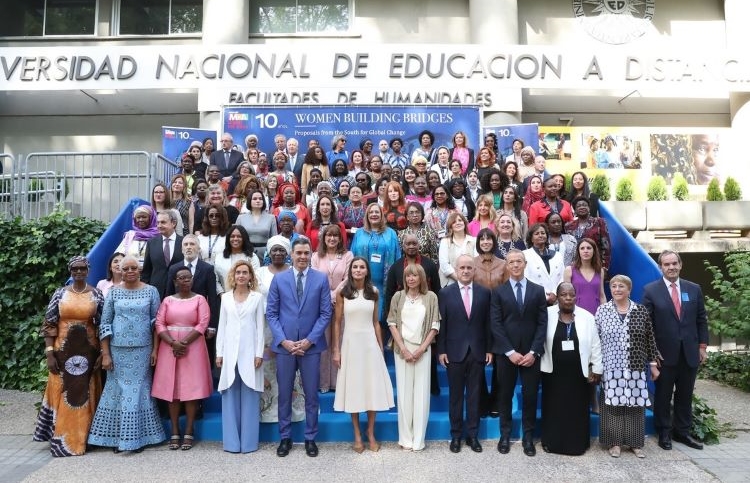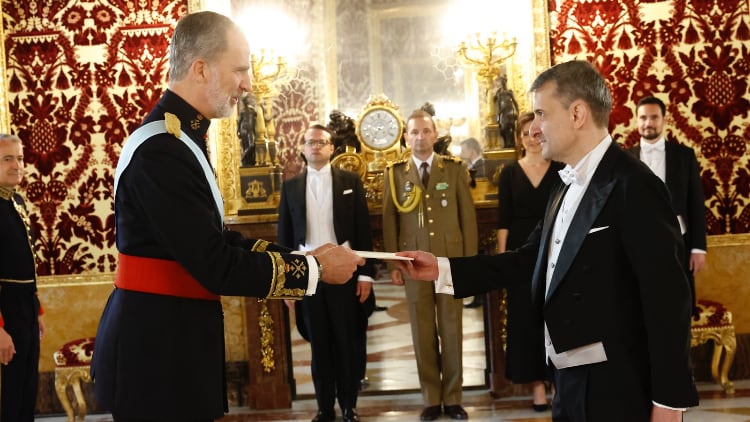The Diplomat
Yesterday, Queen Letizia presided over the inauguration of Women building bridges. Proposals from the South for global change, a conference organized by the Women for Africa Foundation on the occasion of its tenth anniversary, with the participation of a hundred prominent professionals from different fields such as politics, economics, feminism, culture and the media, from Africa, America and Europe.
The Foundation “puts African women at the center, the more than 650 million women and girls who embody 650 million reasons to continue advancing in these necessary processes of social transformation,” said the Queen during the event, held in the Humanities Building of the National University of Distance Education (UNED) in Madrid.
“Studies and data support” that “empowering women, strengthening them in any field,” means “improving all the indicators of progress,” Doña Letizia continued. “Progress and freedom are generated from the transmission of knowledge” and that is “one of the reasons why this foundation places so much emphasis on education,” she said. “Also in health and governance and in the consolidation of cooperation networks between African women that, on this tenth anniversary, are projected more strongly with this intercontinental network that is launched to build bridges between African, Latin American and Spanish women,” she concluded.
Since its creation in 2012, the Women for Africa Foundation, chaired by former Vice President of the Government María Teresa Fernández de la Vega, has created a dense network of African leaders in all areas of work, especially in the political sphere, with the aim of making them protagonists and making equality the driving force of development policy agendas.
“We will not rest until all women and girls can enjoy the full exercise of human rights; we will not stop until we eliminate all violence against women and girls; we will not stop until women participate in all decision-making processes,” declared the President of the Government, Pedro Sánchez, at the same event.
In the current geopolitical context, with a war in the heart of Europe, “we need more than ever” to pay attention to the role to be played by women, the chief executive continued. Although women and girls are “particularly exposed to the impact of war,” as is being observed with “the millions of displaced women from Ukraine or the terrible drama they are suffering under the Taliban regime in Afghanistan,” they are also agents of peace, “and we must rely on them to help us emerge from moments of conflict,” he added.
The event, which began yesterday and concludes today, brings together nearly 70 African political leaders, as well as a significant number of Latin American politicians and activists and heads of international organizations. Among those attending yesterday were the Minister of Foreign Affairs, José Manuel Albares; the Minister of the Interior, Fernando Grande-Marlaska; the Minister of Health, Carolina Darias; the Minister of Science and Innovation, Diana Morant; the Minister of Equality, Irene Montero; the Ibero-American Secretary General, Andrés Allamand; the Belarusian opposition leader Svetlana Tikhanovskaya, the former Prime Minister José Luis Rodríguez Zapatero, the former President of Liberia and Nobel Peace Prize winner, Ellen Johnson-Sirleaf (virtually); the vice-president of the African Union Commission, Monique Nsanzabaganwa; the UN High Commissioner for Human Rights, Michelle Bachelet; the secretary general of UNCTAD, Rebeca Grynspan; the vice-president of ECOWAS, Finda Koroma; the president of the Foundation, María Teresa Fernández de la Vega; the president of the Congress of Deputies, Meritxell Batet; the president of the Senate, Ander Gil; and the rector of the UNED, Ricardo Mairal.
In the margins of this meeting, José Manuel Albares met with Bachelet, with whom he discussed the human rights situation in Nicaragua, Afghanistan and Ukraine (and who was also received by Pedro Sánchez at La Moncloa to address, among other issues, the new restrictions against the freedom of women and girls in Afghanistan); and with Nsanzabaganwa, with whom he discussed the situation in the Sahel, food security in Africa and the fight against terrorism.







